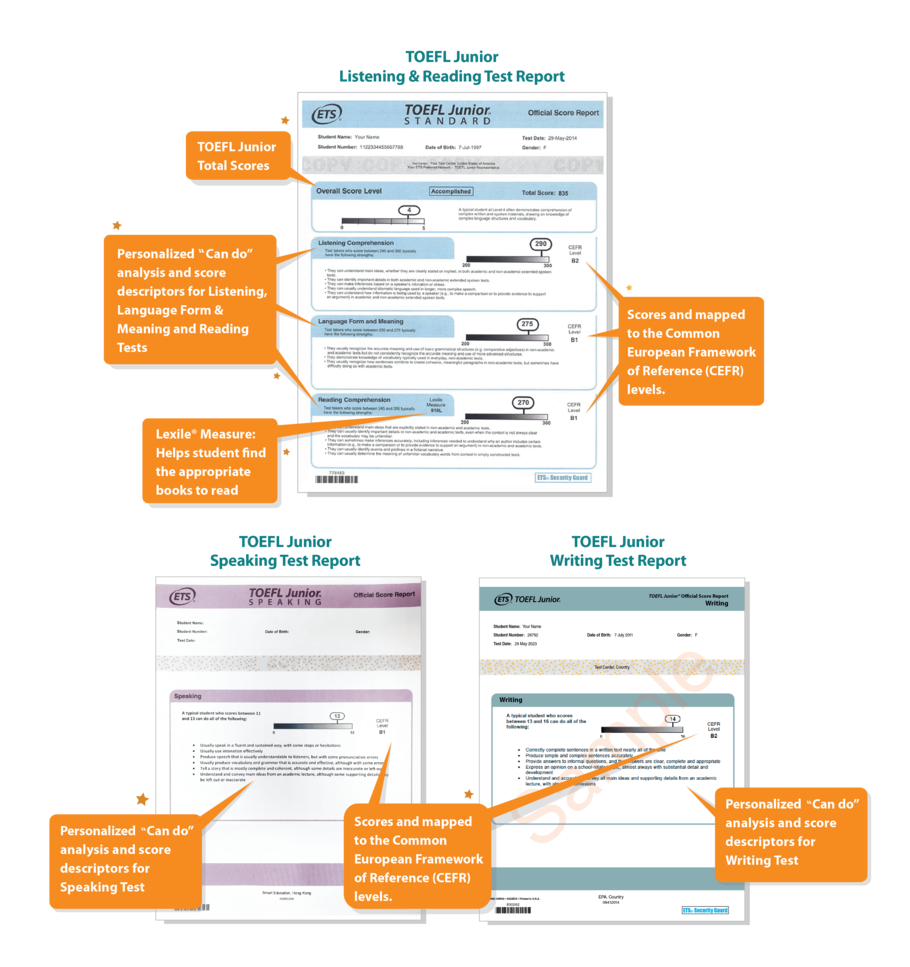About TOEFL Junior ® Test

The TOEFL Junior ® Tests measures the degree to which middle-school students have attained proficiency in the academic and social English-language skills representative of English-medium instructional environments.
Usually these students are ages 11-15. However, the test may be appropriate for other students. It is a general English-language proficiency test not based on or limited to any specific curriculum. The appropriateness is based on the English-language proficiency of the students.
Make an Early Impact that Lasts a Lifetime
The TOEFL Junior ® tests, intended for students ages 11+, provide real insight into your students' English communication skills to help you make the best decisions and guide them on a path to success.
To better meet the expectations of English-language programs worldwide, the TOEFL Junior tests measure a range of skills:
- TOEFL Junior ® Standard test — paper-based test, the test that measures Reading Comprehension, Listening Comprehension, and Language Form and Meaning.
- TOEFL Junior ® Speaking test — a digitally delivered test that measures students' ability to communicate orally in English in an academic classroom.
- TOEFL Junior ® Writing test — digitally delivered test that measures students' writing ability in English in an academic classroom through communicative tasks.
Both the TOEFL Junior Standard and Speaking tests are available on the following digital platforms: Windows ® PC, Mac ® , iPad ® and Chromebook ™.
TOEFL Junior ® Test Design
The TOEFL Junior ® Test is a paper-based test consisting of 126 multiple-choice questions. It includes three sections: Listening Comprehension, Language Form and Meaning, and Reading Comprehension. Each section contains 42 four-choice questions.
The table below summarizes the structure and timing of the test:
| Sections | Listening Comprehension | Language Form and Meaning | Reading Comprehension |
| Format | 40 mins,Paper– based test | 25 mins,Paper– based test | 50 mins,Paper– based test |
| Questions | 42 multiple choice questions prompt | 42 multiple choice questions prompt | 42 multiple choice questions prompt |
| Scoring | Total scores range from 200 to 300 | Total scores range from 200 to 300 | Total scores range from 200 to 300 |
1. Listening Comprehension
The section is designed to measure the listening skills needed for success in an English-medium instructional environment.
Three key skills are measured - the abilities to listen for:
- Basic, interpersonal purposes
- Instructional purposes
- Academic purposes
Listening: Classroom Instruction
Classroom Instruction items provide students with the opportunity to demonstrate their ability to understand information disseminated as instructions, announcements, etc. by teachers and other school staff. Listening abilities tested include:
- Main idea
- Speaker's purpose
- Inference
- Prediction
Listening: Short Conversations
Short Conversations provide students with the opportunity to demonstrate their ability to listen to and understand short conversations about student life in English. Listening abilities tested include:
- Main idea
- Detail
- Inference
- Prediction
- Rhetorical device
- Prosody
Listening: Academic Talks
Academic Listening sets provide students with the opportunity to demonstrate their ability to learn new information in English in an academic context. Listening abilities tested included:
- Main idea
- Detail
- Inference
- Prediction
- Rhetorical device
- Prosody
2. Language Form and Meaning
The section is designed to assess students' understanding of the structure of English and the depth of their vocabulary knowledge. The items are as close exercises embedded within a single paragraph.
Text Types:
- Expository
- Biographical
- Correspondence
- Announcement
- Advertisement
- Fiction
Language Meaning Question Types:
- Noun
- Verb
- Modifier
- Determiner
- Preposition
- Conjunction
Language Form Question Types:
- Subject
- Object
- Subject and verb
- Verb form
- Passive voice
- Adjective or adjective phrase
- Adverb or adverb phrase
- Object complement
- Relative clause
- Noun phrase or noun clause
- Expletive
- Comparative or superlative
- Predicate nominative
- Word order
- Word form
3. Reading Comprehension
The section is designed to assess the degree to which students have the reading skills representative of English-medium instructional environments. This includes two general types of reading:
- The ability to read and comprehend academic texts
- The ability to read and comprehend non-academic texts
Text types are representative of genres that middle school students might encounter in a classroom
- Non-linear texts
- Correspondence
- Journalism
- Fiction
- Expository
- Biographical
- Persuasive
TOEFL Junior ® Speaking Test Design
The TOEFL Junior ® Speaking Test is a digitally administered test consisting of 4 tasks, the table below summarizes the structure and timing of the test:
| Sections | Speaking |
| Format | 20 mins, digitally administered |
| Questions | 4 tasks prompt |
| Scoring | Total scores range from 0 to 16 |
With the TOEFL Junior ® Speaking Test, students can:
- Demonstrate understanding of text by reading aloud
- Use oral language successfully to complete basic communicative tasks
- Use oral language effectively to convey information about academic course content
4 Tasks at A Glance
| Tasks | Evaluation |
| Read Aloud | Evaluates discrete features of oral proficiency |
| Picture Narration | Evaluates routine everyday language |
| Listen-Speak - Class/ School Activity | Evaluates routine navigational language in a school environment |
| Listen-Speak - Academic Talk | Evaluates the use of academic language representative of middle school course content |
TOEFL Junior ® Writing Test Design
The TOEFL Junior ® Writing Test is a digitally administered test consisting of 5 tasks, the table below summarizes the structure and timing of the test:
| Sections | Writing |
| Format | 40 mins, digitally administered |
| Questions | 5 tasks prompt |
| Scoring | Total scores range from 0 to 16 |
With the TOEFL Junior ® Writing Test, students can:
- Identify correct grammatical and/or mechanics forms in a written academic text
- Use Written language effectively to communicate social/interpersonal information
- Produce effective paragraphs in a range of genres across academic subjects
TOEFL Junior ® Writing Tasks
| Tasks | Evaluation |
| Edit | Enabling skills (grammatical and mechanical) that underlie communicative writing skills |
| Use of everyday language, syntax, and vocabulary | |
| Opinion | Ability to express and provide support for an opinion |
| Listen-Write | Ability to understand an academic talk and provide the main points and important details |
TOEFL Junior ® Score Report features
- Include section and total scores as well as "can-do" statements that can use to help students, parents and instructors understand students' proficiency levels and progress.
- Scores are mapped to the Common European Framework of Reference (CEFR) levels.
- A Lexile measure to help find books at the task taker's English reading level.
